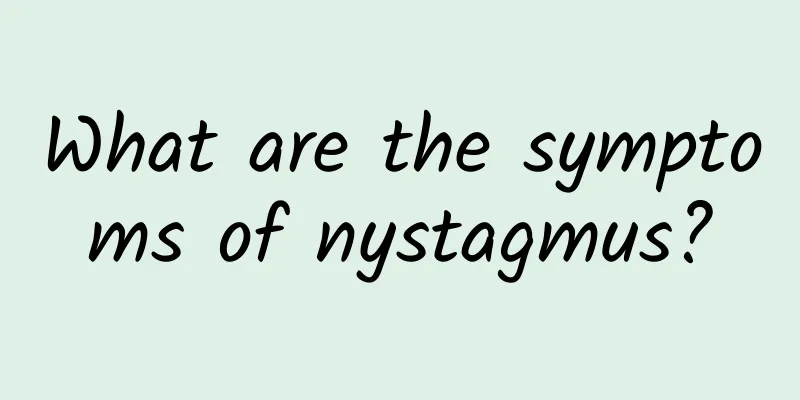What are the symptoms of nystagmus?

|
In modern society, due to the development of science and technology and the popularity of electronic products due to the advanced communications, the burden on the eyes is greater. Having a good vision is the expectation of most people nowadays, so people pay more and more attention to the eyes. The nystagmus we are going to talk about today is a kind of eye disease. Nystagmus is an involuntary, rhythmic, back-and-forth swinging eye movement. It is not an independent disease, but is caused by certain diseases. Let's take a look at the symptoms of nystagmus. Types and symptoms of nystagmus: 1. There are several types of physiological nystagmus. When the eyes are fixed on the peripheral part of the visual field, 50-70% of people may experience irregular rhythmic impulsive nystagmus of both eyes, which is called terminal nystagmus. When both eyes follow a moving target and look to the side, impulsive nystagmus of both eyes may occur. It's called optokinetic nystagmus. 2. Pathological nystagmus can be divided into: (1) Ocular nystagmus: It is mostly caused by congenital eye developmental abnormalities or early postnatal illness, blindness or central macular vision disorders, which prevent the gaze reflex from being fully established. Seen in albinism, congenital cataracts, macular coloboma, choroidal coloboma, and optic nerve developmental abnormalities. Nystagmus is mostly horizontal oscillation. Infant nod spasm and miner's nystagmus also belong to this category. (ii) Labyrinthine nystagmus: It is caused by damage to any part of the labyrinth, vestibular nerve, or vestibular nucleus on one side, which can produce excessive or low vestibular nerve response on that side. Mostly horizontal or rotational impulsive. Mild stimulation of the labyrinth will cause nystagmus to the affected side, and destructive injury will cause nystagmus to the unaffected side. Patients often suffer from vertigo and hearing impairment. (III) Central nystagmus: It is caused by lesions that may be located in the vestibular nucleus and connect to the brainstem, cerebellum, and spinal cord. Most of them are horizontal, rotational or vertical impulsive, and rarely oscillatory. Occurs when the eyes turn together to one side. There is no vertigo or hearing impairment, often accompanied by other symptoms and signs of central nervous system damage. (IV) Congenital idiopathic nystagmus: It is a congenital impulsive nystagmus with no abnormalities in the eyes and nervous system. Poor vision is caused by tremor of objects. It is hereditary and the degree of tremor varies from person to person. There is an area in the slow phase direction where the nystagmus is mild, so vision in this direction can be significantly improved. Patients often like to use compensatory head position to make this area often located in front of the field of vision to improve vision. For such patients, placing a prism with the base facing the head in front of both eyes can eliminate the compensatory head position and improve visual acuity. (V) Other nystagmus 1. Hysterical nystagmus: Various irregular and bizarre nystagmus may occur, with a frequency of up to about 1000 times per minute, mostly horizontal. 2. Toxic nystagmus: Central nystagmus may also occur in poisoning by drugs such as barbiturates and alcohol or in acute infectious diseases. |
<<: The main symptoms of hemorrhoids
>>: The efficacy and function of Chinese medicine leeches
Recommend
Why do I feel a dull pain in my lower abdomen after medical abortion?
After medical abortion, there may be a dull pain ...
Why does bird’s nest have a musty smell?
Bird's nest is a very nourishing food with ma...
The efficacy and function of honey mulberry bark
The effects and functions of honey mulberry bark ...
What causes pain in upper limb joints?
If you experience pain in the upper limb joints, ...
What are the traditional Chinese medicines for detoxification and beauty?
It is women's nature to love beauty, which is...
What are the benefits of drinking Astragalus tea?
Astragalus is a relatively common Chinese medicin...
How to Whiten Fluoride
Everyone hopes to have beautiful white teeth, but...
Symptoms of bone tuberculosis
With the continuous improvement of modernization,...
What are the benefits of moxibustion on Zusanli?
Moxibustion is a traditional Chinese treatment me...
How many days does it take for Haima Duobian Pills to be effective?
The Haima Duobian Pill for Qinggong Surgery is co...
Diet therapy, the best treatment for chronic pharyngitis
Chronic pharyngitis is a common and frequent dise...
What does Danshen treat?
In daily life, many friends need to pay attention...
Can I still eat Chinese medicine after it has been stored for a year?
As the old saying goes, who can avoid the cycle o...
Medicinal value of chicken thorn root
The medicinal value of chicken thorn root is main...
Dehumidifying tea recipe
Every summer, the climate is particularly humid a...









